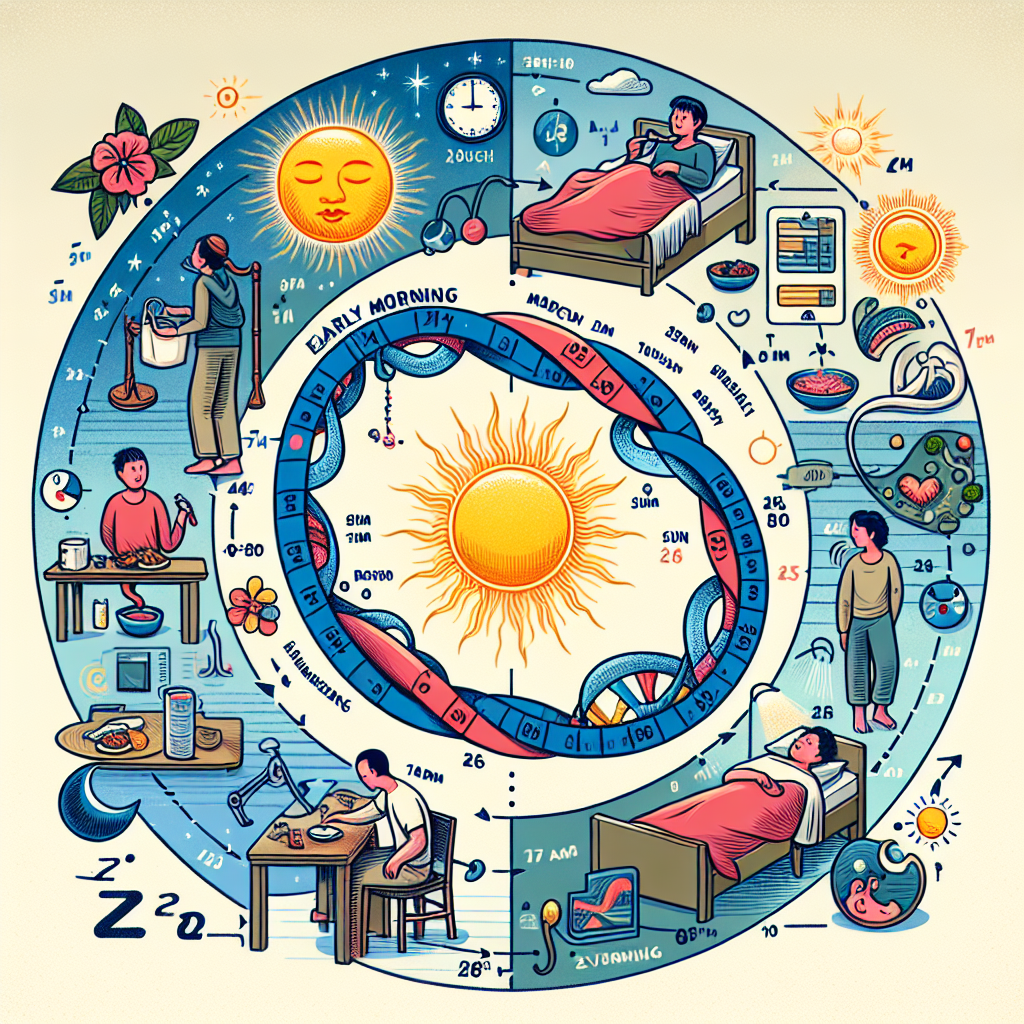Circadian Rhythm: In 24 Hours, When You Eat Matters Most.
Have you ever thought about how the timing of your meals could be just as important as what you eat? It’s an interesting concept, right? Many of us are caught up in figuring out the best foods for our health, weight management, or energy. But recent research suggests that when we eat can also play a big role in these areas. So, why not grab a healthy snack and join me as we dive into the fascinating world of circadian rhythms and see how they affect our eating habits?
The Calendar of Circadian Rhythm and Food Timing
Before we get into the details about meal times, let’s take a moment to talk about circadian rhythm. Think of it as your body’s internal clock that runs on a 24-hour schedule. This clock helps regulate various changes in your body, like when you feel awake or sleepy, how warm you are, and even when you get hungry or digest food.
Understanding this rhythm can help us see how it influences our eating habits and overall health.
Appreciating Your Inner Clock
circadian rhythm: the science behind it
The rise and fall of the sun shapes the roughly 24-hour cycle our bodies run. Located in the brain, more especially in an area known as the suprachiasmatic nucleus (SCN), this internal clock It’s amazing how carefully this small cluster of neurons synchronises the operations of our body with the outside world.

Keeping Circadian Rhythm: The Function of the Suprachiasmatic Nucleus (SCN)
Using data on light exposure from our eyes, the SCN modulates our circadian rhythm. From hormone release to digestion, it’s like our body’s master planner, making sure everything goes perfectly and on schedule.
The Way Light Affects Circadian Rhythm
The strongest signal we have for adjusting our body’s internal clock is light. Natural daylight helps us manage our sleep-wake cycles, keeping us awake and alert during the day and making us feel sleepy at night. Have you ever noticed how going camping can change your sleep patterns? That’s your circadian rhythm getting back on track!
How Derailing Circadian Rhythm Affects Health
Disturbances of our internal clock can lead to a variety of health issues, including sleep disorders, depression, obesity, fatty liver diseases, diabetes, and perhaps heart disease. It’s like playing a dangerous game of dominoes; one piece falls, and the others most likely follow suit.
Timing and Its Effects on Control of Weight
Meal Timing's Relationship with Weight Gain
New studies point to late-night eating as possibly causing weight gain. What then? Since it contradicts our normal circadian pattern of more effective food metabolism during the day.
Studies showing weight increase depending on eating late rather than early
Studies have indicated that those who eat calories later in the day often weigh more than those who eat most of their calories early in the day. Especially when it comes to controlling our waistlines, time apparently is everything.

Time frames for Optimal Weight Reduction
For weight loss, combining techniques like time-restricted eating—where you eat all of your meals inside a designated window—can be quite successful. Working with your body’s natural circadian cycle is everything; it’s not about fighting it.
The relationship between our circadian rhythm and general health
is truly intriguing, especially when it comes to gut health and digestion. Essentially, our bodies have a natural internal clock that regulates various functions, including when we feel hungry and how well we digest food.
Eating meals at regular times that align with this internal clock can make a big difference. For instance, when we stick to a consistent eating schedule, our stomach can work more efficiently, leading to less discomfort and better absorption of nutrients. This means that our gut seems to thrive on routine, much like how we feel better when we maintain a regular sleep schedule.
So, paying attention to when we eat, alongside what we eat, can promote a healthier gut and improve our overall well-being.
Sleep and Its Interplay with Meal Times
Having your last meal or snack at least two to three hours before bed will enable your body to break down the food correctly and prevent any disturbances to your sleep. If you find yourself hungry before bed, choose light and easily digestible foods like a little yogurt, a piece of fruit, or a handful of nuts. A more peaceful night’s sleep can also result from keeping hydrated all day and restricting sugary foods and caffeine near bedtime. Making little changes and being aware of your eating patterns will help you to prepare yourself for a restful and energizing evening.
Useful Guide for Coordinating Your Meals with Your Body Clock Using circadian Rhythm
Try eating in the daytime.
Following a 12-hour eating window, say from 7 a.m. to 7 p.m., helps you match your eating schedule to your body’s natural cycles. This can help your body, which is busier and more fuel-starved during the day, increase insulin sensitivity.
Limiting your food to this time might also help to avoid extra calories accumulating as fat over night. It’s a basic and quick approach to enable your body to function as it should and improve general health.
The key is to remember to pay attention to your body and identify a schedule that fits you best. Try several eating schedules and observe your feelings to identify the one that best fits you. Your body will be content for the love, care, and attention you pay.
Must have had. Morning Breakfast
Starting your day with a nutritious meal will help you to be successful in terms of your general well-being. Including nutrient-dense foods, including whole grains, fruits, lean meats, and good fats, can provide you the vitality and nourishment you need to face the day. Finding a breakfast that fits you is crucial, whether it’s a quick smoothie, a bowl of oats topped with fresh berries, or some Greek yogurt with nuts and seeds.
Breakfast is more than just a meal; it’s a way to kickstart your day. Eating in the morning boosts your brainpower and helps you focus better, while also keeping your metabolism in check and reducing those pesky cravings later on. Remember, breakfast fuels both your mind and body. So, take a moment to nourish yourself in the morning and enjoy the positive effects throughout your day!
Don't overlook lunch.
Although a balanced breakfast is vital, studies show that a large lunch helps control weight even more. This result emphasizes the need for meal timing in reaching targets for weight loss. Those who give lunch top priority as the primary meal of the day could gain from better digestion and metabolism.
Eating a large lunch early in the day might also help control appetite and avoid later on overindulgence. Including nutrient-dense meals in your noon meal will help you stay generally well and offer consistent energy levels. Remember, obtaining your ideal weight and maintaining a good lifestyle depend much on the lunch you choose to be balanced and fulfilling.
Have a modest supper.
Our bodies start to reject insulin more as the day goes on, particularly at night. We should be aware of our eating behaviors, particularly in relation to our health. Choosing smaller, nutrient-dense dinners and avoiding evening meals heavy in carbohydrates can assist our bodies in following their natural rhythms and boost general well-being. By timing our final meal, we can help our bodies to perform better and possibly ease their load.
Recall that keeping a good lifestyle mostly depends on fueling our body with healthy foods and appreciating our inner clock. Therefore, whether it’s a vibrant salad or a filling bowl of soup, let’s choose foods that not only fulfill our taste receptors but also assist our long-term health objectives.
Beginning With Circadian-aligned Eating
Start by noting your body’s natural wake and sleep rhythms and work to plan meals around these rhythms. While evenings should be lighter and earlier to help your body prepare for sleep, morning meals should be substantial and nourishing to drive your day.
Overcoming Common Obstacles
Meal timing can be difficult, particularly in social or business environments. Making conscious decisions and advance planning will help you control these circumstances without totally off-balancing your body.
Meal Planning for Optimizing Circadian Rhythm
Think about creating meal plans based on patterns of natural light. Plan larger meals for the first half of the day and lighter meals as the day goes on using a range of nutrient-dense foods.
In conclusion
Ignoring “when” and concentrating just on “what” to eat is like trying to sail without a compass. Matching your eating schedule with the circadian clock of your body will improve metabolism, help control weight, and support general health. Thus, keep in mind the time as well as the dish as you consider your next dinner. Not only should we choose healthy foods, but also should we synchronize our selections with the natural rhythms of our body. Every mouthful counts. Regarding health, time is not only crucial but also possibly the only thing that matters.
FAQ
Absolutely! Meal timing plays a critical role in how our body processes food, impacting weight, metabolism, and overall health.
Some benefits, like improved sleep and digestion, can be noticed within a few days or weeks. However, long-term metabolic and weight management benefits may take longer.
It’s never too late! Making small, gradual changes can lead to significant health improvements over time.
Flexibility is key. Aim for consistency where possible and make mindful choices that support your body’s natural rhythms.
Occasional deviations won’t undo all your progress. The goal is consistency, not perfection. Aim for a balanced approach that suits your lifestyle and health goals.


